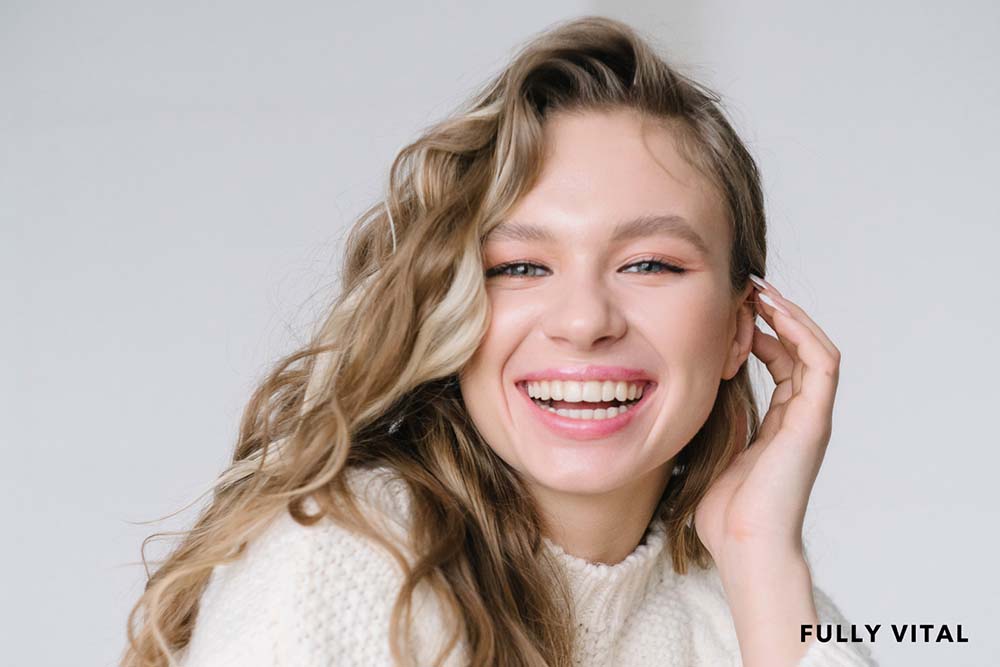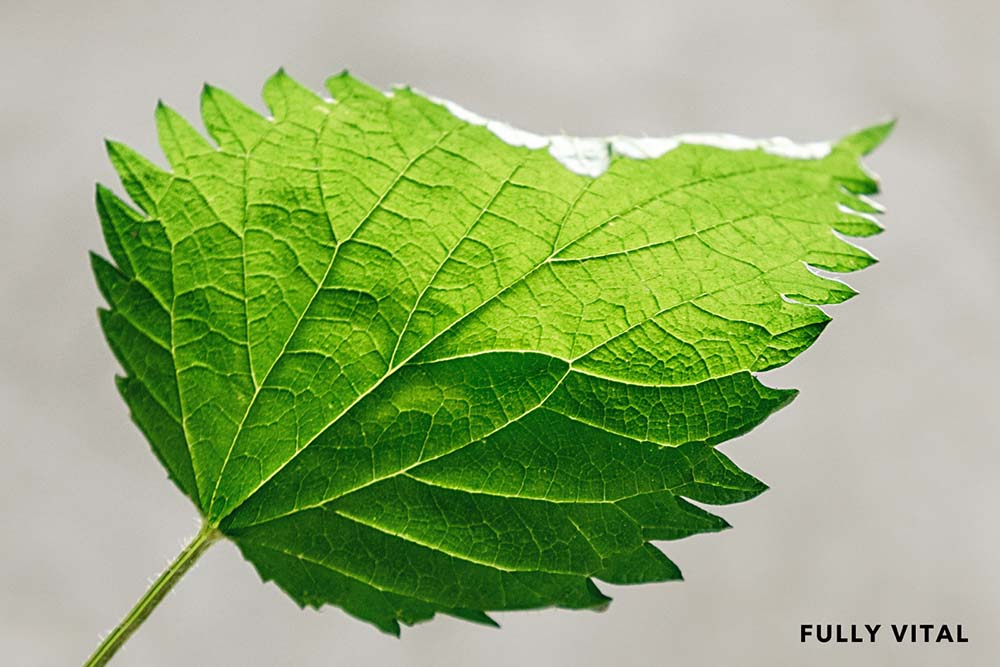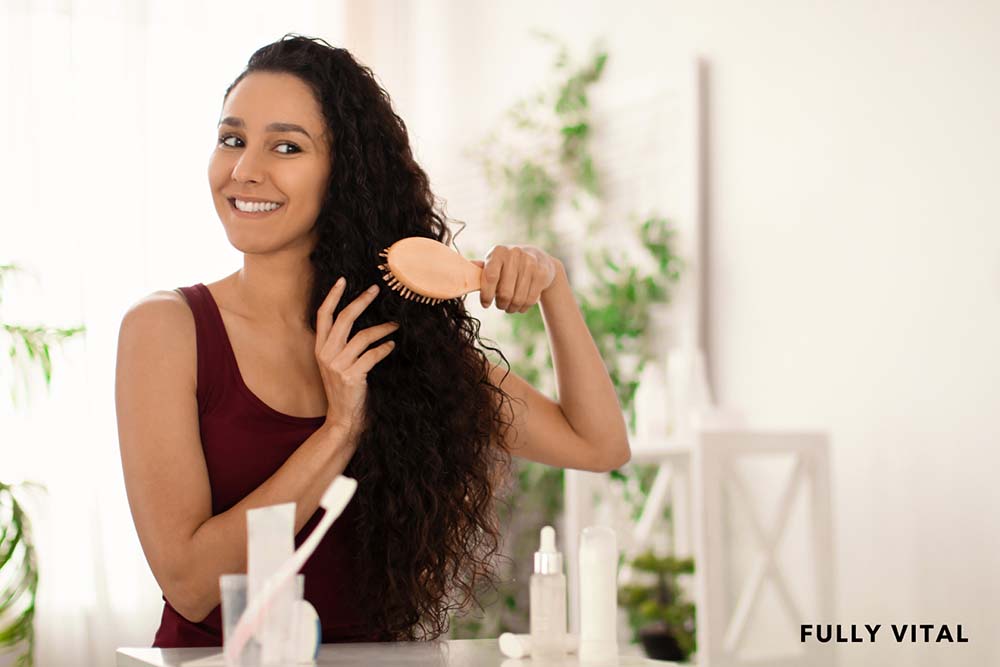
Panthenol and Its Use In Haircare
Discover the power of panthenol, the secret to unlocking vibrant, stronger hair growth.
In this guide, we unveil the wonders of this transformative ingredient.
From its origins to its remarkable benefits, we'll explore why panthenol has become a must-have for women of all hair types.

I LOVE MY HAIR NOW
FullyVital hair serum and hair vitamins made tremendous improvements in my hair. I truly love my hair now.
Meg S.,
At Fully Vital, we're committed to creating science-backed hair growth products that harness panthenol's potential.
Join us on this journey to embrace a healthier, more vibrant you.
What is Panthenol?
Panthenol, also known as provitamin B5, is a popular ingredient in hair care products due to its remarkable benefits for hair growth.(1)
Derived from pantothenic acid, panthenol is a water-soluble vitamin that easily penetrates the hair shaft and provides numerous advantages for achieving healthy, luscious locks.

Why is Panthenol Important?
Panthenol plays a crucial role in hair care because of its ability to enhance moisture retention, strengthen hair strands, and promote overall hair health.
It acts as a humectant, attracting and retaining moisture in the hair, thereby preventing dryness and brittleness.
This makes panthenol an essential ingredient for women of all hair types who are seeking to stimulate hair growth.
How Does Panthenol Work?
Panthenol works its magic by penetrating the hair shaft and converting into pantothenic acid, a key component of coenzyme A.
This conversion process strengthens the hair from within and helps repair damage caused by environmental factors, heat styling, and chemical treatments.
Additionally, panthenol creates a thin film on the surface of the hair, known as a humectant layer, which prevents moisture loss and adds a natural shine.
What Are the Benefits of Panthenol?
The benefits of panthenol for hair growth are numerous and impressive.
Here are some key advantages that make it a go-to ingredient for women looking to achieve vibrant, healthy hair:
Moisture Retention
Panthenol acts as a humectant, attracting and locking in moisture, preventing dryness and breakage.(2)
Strengthens Hair
By converting into pantothenic acid, panthenol strengthens the hair shaft, making it more resistant to damage.
Promotes Hair Growth
With its ability to repair and nourish the hair follicles, panthenol stimulates hair growth, leading to thicker and fuller hair.
Adds Shine
The humectant layer formed by panthenol on the hair's surface reflects light, resulting in a radiant shine.
Improves Elasticity
Panthenol enhances hair flexibility, reducing the risk of breakage and split ends.(3)
Protects Against Environmental Damage
This versatile ingredient shields the hair from harmful UV rays, pollution, and other external aggressors.
What Is The History of Panthenol?
Panthenol has a rich history in the hair care industry, dating back several decades. Here's a brief overview:
Discovery
Panthenol was first discovered in the 1930s by a Swiss chemist named Konrad Wettstein.
Early Applications
Initially, panthenol found its use in the pharmaceutical industry for its wound healing and skin moisturizing properties.
Entry into Hair Care
As the understanding of panthenol's benefits expanded, it made its way into hair care formulations, where its moisturizing and strengthening properties became highly valued.
Industry Adoption
Over time, panthenol became a staple ingredient in numerous hair care products, including shampoos, conditioners, leave-in treatments, and styling products.
Customer Satisfaction
The popularity and positive feedback from customers further solidified panthenol's reputation as an effective ingredient for promoting healthy hair growth.
What Is The Current Environment of Panthenol?
In the current hair care industry, panthenol continues to play a significant role in providing women with effective solutions for stimulating hair growth.
Here's a snapshot of the current environment:
Wide Availability
Panthenol can be found in a wide range of hair care products, both in mass-market brands and professional salon lines.
Consumer Demand
Women of all hair types and backgrounds increasingly seek no hair care products that promote growth and overall hair health, which has fueled the demand for panthenol-infused formulations.
Scientific Research
Ongoing scientific research supports the efficacy and benefits of panthenol for hair growth, providing further validation for its inclusion in hair care products.
Ingredient Innovation
The hair care industry continues to innovate and explore new ways to incorporate panthenol into advanced formulations, combining it with other beneficial ingredients to enhance its effects.
Positive Feedback
Customer testimonials and positive reviews highlight the effectiveness of panthenol in improving the condition of the hair, encouraging more women to incorporate it into their hair care routines.
What Is The Future of Panthenol?
Panthenol is poised to maintain its position as a key ingredient in the hair growth product industry.
Here are some glimpses into the future:
Continued Research
Ongoing scientific research will further explore the potential benefits of panthenol, uncovering new insights and applications in hair care.
Formulation Advancements
Hair care brands will continue to innovate, developing new formulations and delivery systems that optimize the efficacy and absorption of panthenol.
Sustainable Sourcing
With growing environmental consciousness, there may be a shift towards sourcing panthenol from sustainable and eco-friendly sources, aligning with the industry's focus on sustainability.
Customization and Personalization
As technology advances, hair care formulations may become more personalized, allowing individuals to tailor their products to their specific hair needs, potentially including panthenol as a key ingredient.
What is Panthenol Used For?
Panthenol is widely used in hair care products for its numerous benefits and its ability to promote healthy hair growth.
It serves several purposes in hair care, including:
Moisturizing
Panthenol attracts and retains moisture in the hair, preventing dryness and promoting hydration.
Strengthening
By converting it into pantothenic acid, panthenol strengthens the hair shaft, making it more resistant to damage.
Repairing
Panthenol helps repair damage caused by heat styling, chemical treatments, and environmental factors.
Protecting
It forms a thin film on the hair's surface, acting as a protective barrier against UV rays, pollution, and other external aggressors.
Enhancing Shine
The humectant layer formed by panthenol reflects light, resulting in a natural, healthy shine.
Promoting Hair Growth
Panthenol nourishes the hair follicles, stimulates hair growth, and contributes to thicker and fuller hair.
Why Is Panthenol Good for Hair?
Panthenol is exceptionally beneficial for hair due to its unique properties and actions.
Here's why panthenol is considered a star ingredient for achieving healthier, more vibrant hair:
Moisture Retention
Panthenol acts as a humectant, attracting moisture and preventing water loss, which helps combat dryness and brittleness.
Strength and Resilience
Through its conversion into pantothenic acid, panthenol strengthens the hair shaft, making it more resilient to breakage and damage.
Repair and Protection
Panthenol repairs and nourishes the hair, restoring its health and protecting it from environmental stressors and styling damage.
Versatility
Panthenol is suitable for all hair types, making it an inclusive ingredient that can benefit everyone, regardless of their hair texture or condition.
Is Panthenol Safe for Natural Hair?
Yes, panthenol is safe for natural hair.
In fact, it is highly recommended for those with natural hair due to its hydrating and strengthening properties.
Panthenol effectively nourishes and moisturizes natural hair, enhancing its health and promoting growth.
Does Panthenol Thicken Hair?
While panthenol does not directly thicken the hair strands, it promotes healthier hair growth, which can result in the appearance of thicker hair over time.
By strengthening the hair shaft, preventing breakage, and nourishing the follicles, panthenol contributes to fuller and more voluminous-looking hair.
Are There Any Downsides to Panthenol?
While panthenol is generally safe for use and well-tolerated by most individuals, some people may experience mild allergies or sensitivities.
It is always recommended to perform a patch test before incorporating new products containing panthenol into your hair care routine.
If any adverse reactions occur, discontinue use and consult a dermatologist.
Is Panthenol FDA Approved?
Yes, panthenol is FDA-approved.
It is considered safe for cosmetic use and has undergone extensive testing to ensure its efficacy and safety.
The FDA approval confirms that panthenol is a reliable and trusted ingredient for hair care products.
What Are the Alternatives to Panthenol?
Although panthenol is an exceptional ingredient for stimulating hair growth, there are alternative options available for those seeking different solutions.
Some alternatives to panthenol include:
Biotin
A B vitamin that promotes hair growth and strengthens the hair shaft.
Niacinamide
Also known as vitamin B3, it improves blood circulation to the scalp, nourishing hair follicles.
Aloe Vera
Known for its soothing properties, aloe vera moisturizes the scalp, promoting healthier hair growth.
Rosemary Oil
Stimulates hair follicles and increases blood circulation, leading to improved hair growth.
Saw Palmetto
An herbal extract that inhibits the production of dihydrotestosterone (DHT), a hormone associated with hair loss.
Unlock the Secrets to Youthful Hair!At Fully Vital, we're passionate about helping you embrace a healthy relationship with your locks. Our powerful, science-backed hair growth products are specially formulated to stop the aging of your hair and restore its vitality. Experience the transformation as you:
Experience the power of Fully Vital's hair growth products and unlock the secrets to youthful, radiant hair. It's time to take control and nurture your locks to their full potential. |
Final Thoughts On Panthenol
Panthenol emerges as a vital ingredient in the world of hair care, particularly for those looking to stimulate hair growth and maintain healthy locks.
Its moisturizing, strengthening, and protective properties make it a valuable addition to hair care products for women of all hair types.
Throughout this article, we have explored the significance of panthenol, delving into its benefits, usage, safety, and alternatives.
We have discussed its role in promoting hydration, strengthening the hair shaft, repairing damage, and enhancing overall hair health.
Panthenol's versatility and effectiveness have made it a sought-after ingredient in the hair growth product industry.
As you embark on your journey to healthier, more vibrant hair, we invite you to explore the benefits of panthenol-infused products.
At Fully Vital, we understand the importance of maintaining a healthy relationship with your locks.
That's why we offer a variety of hair growth products designed to stop the aging of your hair, providing nourishment, support, and rejuvenation.
Discover the power of panthenol and its transformative effects on your hair.
Take the next step towards revitalizing your locks and embracing a more confident you.
Frequently Asked Questions about Panthenol (FAQ)
Is panthenol suitable for all hair types?
Yes, panthenol is suitable for all hair types, including straight, wavy, curly, and coily hair.
Can panthenol be used on color-treated hair?
Absolutely! Panthenol is safe for use on color-treated hair and can even help maintain the vibrancy of your color.
How often should I use hair products with panthenol?
The frequency of use depends on your hair care routine and individual needs.
It is generally safe to use panthenol-infused products daily or as recommended on the product label.
Can panthenol repair split ends?
While panthenol cannot repair split ends entirely, it can help prevent further damage by strengthening the hair shaft and improving overall hair health.
Are there any specific precautions to keep in mind when using panthenol?
Panthenol is considered safe for use; however, if you have any known allergies or sensitivities, it is best to consult with a healthcare professional or perform a patch test before incorporating panthenol-based products into your hair care routine.
Can panthenol make my hair greasy or weighed down?
No, panthenol is a lightweight ingredient that does not leave a greasy or heavy residue on the hair.
It absorbs quickly and adds moisture without weighing the hair down.
What is the difference between panthenol and vitamin b5?
Panthenol and vitamin B5 are often used interchangeably, but there is a slight difference between the two.
Here's a breakdown:
-
Panthenol:
Panthenol is the alcohol form of pantothenic acid, also known as provitamin B5. It is a derivative of vitamin B5 and is converted into pantothenic acid once absorbed by the hair and skin.
-
Vitamin B5:
Vitamin B5, or pantothenic acid, is an essential nutrient that plays a vital role in maintaining healthy hair, skin, and nails. It is found naturally in various foods.
Is panthenol the same as dexpanthenol?
No, panthenol and dexpanthenol are not the same, although they are related.
Dexpanthenol is the biologically active form of panthenol.
When applied topically, dexpanthenol is converted into pantothenic acid, which provides nourishment and support to the hair and skin.
Panthenol, on the other hand, refers to the alcohol form of pantothenic acid before it is converted into its active form.
Can I use panthenol on dandruff?
While panthenol does not directly target dandruff, it can help improve the overall health of the scalp and hair, which may indirectly alleviate dandruff symptoms.
Panthenol's moisturizing and soothing properties can help reduce dryness and irritation on the scalp, which are common underlying causes of dandruff.
However, it is advisable to consult with a dermatologist for a comprehensive dandruff treatment plan.
Is panthenol a natural ingredient?
Panthenol can be derived from both natural and synthetic sources.
It can be extracted from plants, such as honey, or synthesized in a laboratory.
The resulting panthenol molecule is chemically identical, regardless of its source.
When seeking natural panthenol, look for products that specifically mention natural or plant-derived sources.
How do I store panthenol?
To maintain the quality and effectiveness of panthenol, it is important to store it properly. Here are some storage tips:
-
Cool and Dry
Store panthenol in a cool, dry place away from direct sunlight and heat sources.
-
Tightly Sealed
Keep the container tightly sealed to prevent exposure to air and moisture.
-
Follow Product Instructions
Follow any specific storage instructions provided on the product label or packaging.
Sources:
- Pedroja, C. (2018, August 29). Why Is Panthenol Used in Cosmetics? Healthline; Healthline Media. https://www.healthline.com/health/panthenol
- Panthenol: Uses, safety, and risks. (2022, April 29). Www.medicalnewstoday.com. https://www.medicalnewstoday.com/articles/panthenol
- Pedroja, C. (2018, August 29). Why Is Panthenol Used in Cosmetics? Healthline; Healthline Media. https://www.healthline.com/health/panthenol







